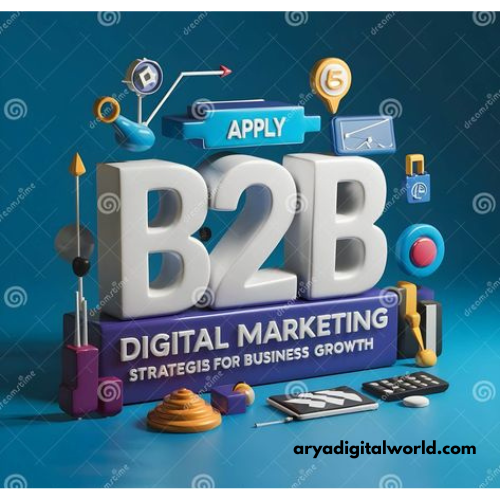B2B digital marketing (business-to-business digital marketing) focuses on strategies and tactics that businesses use to promote their products or services to other businesses online. Unlike B2C (business-to-consumer) marketing, where the emphasis is on appealing directly to consumers, B2B marketing aims to build relationships and drive purchases from other organizations. Here’s a rundown of key components of B2B digital marketing:
1. Content Marketing
- Whitepapers, E-books, and Case Studies: B2B buyers are often interested in in-depth, educational content that helps them solve problems. Resources like whitepapers, e-books, and case studies establish authority and build trust.
- Blogs and Articles: Regular blog posts on industry trends, case studies, and how-to guides help in SEO and position the company as a thought leader.
2. Search Engine Optimization (SEO)
- On-Page SEO: Ensuring website content is optimized for relevant keywords to make it easier for businesses to find your website through organic search.
- Technical SEO: Improving website speed, mobile-friendliness, and other factors that can affect search rankings.
- Link Building: Building high-quality links from reputable industry websites to improve domain authority.
3. Account-Based Marketing (ABM)
- ABM is a highly personalized approach to B2B marketing that targets specific high-value accounts rather than casting a wide net. This approach typically involves a close partnership between sales and marketing to tailor content and messaging for each target company.
4. Social Media Marketing
- LinkedIn: LinkedIn is a powerful B2B platform for sharing industry insights, promoting content, and connecting with decision-makers. Paid LinkedIn ads can target specific industries, job titles, or company sizes.
- Twitter, Facebook, and Instagram: These platforms can be valuable for brand awareness and sharing industry-related content.
5. Email Marketing
- Email remains an effective B2B marketing tool, especially for nurturing leads and guiding them through the sales funnel. Segmentation and personalized content can improve engagement.
6. PPC Advertising (Pay-Per-Click)
- B2B companies often use Google Ads and LinkedIn Ads to reach specific industries, companies, or job titles. PPC can drive traffic quickly and provide detailed analytics to refine campaigns.
7. Webinars and Virtual Events
- Hosting webinars or virtual events allows businesses to provide valuable insights, showcase expertise, and directly engage with their audience. Recorded versions can also be used as ongoing content assets.
8. Data Analytics
- Using analytics tools like Google Analytics, CRM software, and marketing automation platforms to track and optimize campaigns based on performance. Analytics help in understanding buyer behavior, campaign ROI, and lead sources.
9. Influencer and Partnership Marketing
- In B2B, influencers often include industry experts, thought leaders, or well-known brands that are respected in the target industry. Collaboration with these figures can increase credibility and reach.
By focusing on these components, B2B digital marketing can help generate quality leads, shorten sales cycles, and build long-term relationships with other businesses. Let me know if you’d like more details on any specific tactic!

B2B Digital Marketing Benefits
B2B digital marketing offers several benefits for businesses looking to attract, engage, and convert other businesses. Here are some of the most impactful advantages:
1. Wider Reach and Scalability
- Digital marketing allows businesses to reach potential clients beyond geographical limitations. With online campaigns, businesses can target audiences globally or focus on specific regions, scaling efforts according to market demand.
2. Cost-Effectiveness
- Compared to traditional marketing (such as print ads, trade shows, or direct mail), digital marketing can be much more cost-effective. Pay-per-click (PPC) campaigns, social media ads, and content marketing often provide higher returns on investment, especially when targeting high-value B2B clients.
3. Precise Targeting and Personalization
- B2B digital marketing platforms (e.g., LinkedIn, Google Ads) offer advanced targeting capabilities to reach specific industries, job titles, or even individual companies. With data-driven personalization, businesses can deliver customized content and messaging, which can improve engagement and conversion rates.
4. Enhanced Brand Awareness and Authority
- Digital marketing enables businesses to establish their brand presence and showcase expertise through content marketing, social media, and thought leadership. Regularly sharing insights, solutions, and industry news builds trust and establishes the business as an authority in its field.
5. Faster Sales Cycle
- B2B buyers often research extensively before making a purchase. By delivering valuable content at each stage of the buyer’s journey, digital marketing can help accelerate the decision-making process, nurturing leads more efficiently than traditional methods.
6. Improved Analytics and Measurable Results
- Digital marketing tools provide in-depth analytics that allow businesses to track campaign performance in real time. Metrics like website visits, engagement rates, and conversion rates offer valuable insights to optimize strategies continuously. This data-driven approach enables businesses to measure ROI accurately and adjust quickly.
7. Increased Engagement and Interactivity
- Channels like social media, email, and webinars provide opportunities to interact directly with potential clients. Interactive content, such as polls, Q&As, or personalized recommendations, can engage prospects more deeply and build stronger relationships.
8. Enhanced Lead Generation and Nurturing
- Digital marketing allows businesses to capture leads directly through online channels (e.g., landing pages, forms, and CTAs) and nurture them over time with targeted email campaigns, retargeting ads, or content. By consistently nurturing leads, companies can increase their chances of converting them into paying customers.
9. Better Competitor Tracking
- Digital platforms enable businesses to monitor competitor activities closely, from keyword rankings to content strategies. This competitive intelligence helps businesses differentiate themselves and adjust their own marketing strategies as needed.
10. Flexibility and Adaptability
- B2B digital marketing campaigns are highly adaptable. Marketers can test and iterate quickly, respond to market changes, and adopt new tools to stay current with trends. This flexibility allows B2B companies to remain relevant and continuously optimize their campaigns for better results.
In essence, B2B digital marketing enhances brand credibility, shortens sales cycles, and provides insights to make more data-driven decisions—leading to higher growth and stronger customer relationships.
